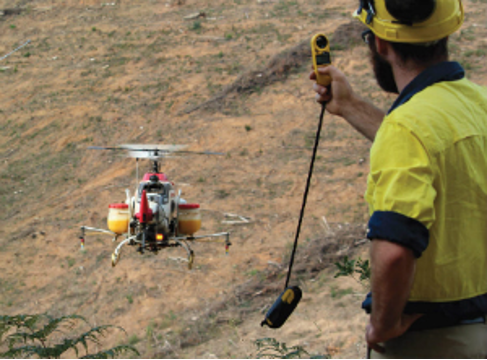Aerial spraying
Aerial spraying of agricultural chemicals in Victoria is regulated by Agriculture Victoria, as well as other agencies like the Civil Aviation Safety Authority (CASA).
If an aircraft is undertaking aerial spraying of agricultural chemicals in Victoria, the pilot must hold a Pilot (Chemical Rating) Licence and the business must hold an Agricultural Aircraft Operator Licence, both issued by Agriculture Victoria.
See Licences for aerial spraying of agricultural chemicals for further information.
Download:
- Aerial spraying of agricultural chemicals
 [PDF File - 3.2 MB]
[PDF File - 3.2 MB] - Aerial spraying of agricultural chemicals
 [MS Word Document - 709.5 KB]
[MS Word Document - 709.5 KB]
All aerial vehicles that undertake aircraft operations are regulated by CASA and must be licensed by that authority.
In July 2017, the requirements for aerial operators were updated.
The 2017 Regulations require that one or more of the following methods be used immediately before and during aerial spraying to provide the pilot with an accurate indication of the weather conditions at the target area:
- a smoke generating device used at ground level at or near the point of spraying
- a smoke generating device that is fitted to the aircraft
- an operating windsock that is clearly visible to the pilot at ground level at or near the point of spraying
- an automatic weather station is located at or near the point of spraying, and information about the wind speed and direction is continuously available to the pilot
- the pilot is in continuous radio communication before and during spraying with a ground-based person, who is located near the point of spraying and uses equipment to measure the wind speed and direction.
Aerial spraying operators must also ensure they comply with any notification requirements that apply.
Landholders must ensure that any maps provided to aerial operators are accurate and not false or misleading as this is an offence.
Interstate Pilot (Chemical Rating) Licences or equivalents from participating states and territories are valid in Victoria. Interstate pilots must comply with all applicable Victorian laws. For more information visit the automatic mutual recognition and chemical use licensing page.
Additional aerial spraying equipment options for pilots
Pilots can now use a ground-based person to monitor wind speed and direction when spraying agricultural chemicals. This change provides greater flexibility in monitoring options, particularly for helicopter operators who typically have a person on the ground near the application site when spraying.
Remotely piloted aircraft

New technology is now available that enables remotely piloted aircraft (RPA) to conduct aerial spraying.
Special licence categories under CASA and the department now exist to authorise and regulate the piloting, spraying and business operations of RPA for aerial spraying.
The legislation governing the use of agricultural chemicals in Victoria applies to RPA users in the same way as it applies to any other aerial spraying contractor.
However, additional conditions apply to licences issued by Agriculture Victoria that authorise the operation and piloting of RPA for aerial spraying. RPA operators must also comply with CASA regulations.
See Licences for aerial spraying of agricultural chemicals for further information.
More information
If you have questions or concerns about the spraying of chemicals from any aircraft, contact 136 186.
If you have any general questions or concerns about the operation of aircraft or RPA, contact CASA 131 757.
For more information visit CASA.